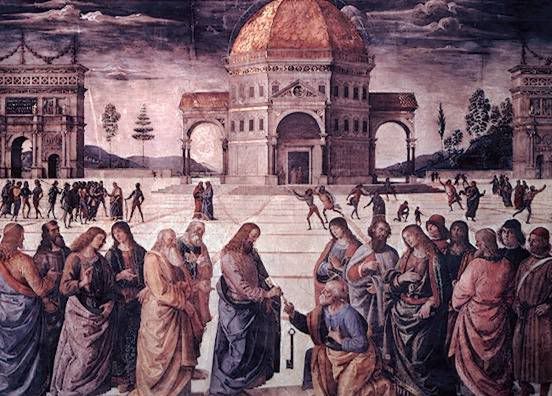Maybe the Catholic Church never had unity…huh?

Over at Called to Commuunion, Chris Donato brought forth an idea that I had not previously pondered: “What if the Church had never been united?”
You can read his comment here at Called to Communion. He cites a new book by by Graham Ward entitled: The Politics of the Discipleship (Baker Academic):
There has never been a time when the church was one. The centralizing of the church around Rome and the papacy was a historical move emerging between the third and fifth centuries in an already divided and contested Christendom. “Each one of you says, ‘I belong to Paul,’ or ‘I belong to Apollos,’ or ‘I belong to Cephas,’ or ‘I belong to Christ,’” as Paul attests in one of his early epistles (1 Cor. 1:12). There has never been a Christendom in terms of a universal kingdom of Christ. While the Roman medieval church was extending both its powers and territorial domain from the eleventh century to the sixteenth, it became increasingly aware of its own smallness. . . . Even before the Reformation’s splintering, Christendom was an ideology only partly realized and internally contested. The church, then, is always to come. It is a promise that forms the horizon within which the churches seek to be and become more fully the church. (p. 25-26)
Let me make three observations:
1) Ward uses criteria that the Catholic Church has never used. It seems here that “unity” means that every single believing Christian was and is in full theological agreement on every matter. This is an impossible criterion, and so, of course, Ward “proves” his point against unity. It would be like an atheist stating, “No one has ever perfectly followed the teachings of Christ, therefore there has never been a “Christian” person. The definition presumes standards that cannot be met. He who creates the definition also creates the conclusion made from the definition…
2) Ward assumes that the observation of historical development undermines the development’s origin. For example, a man plants a sapling and 30 years later returns to find it as a thick and majestic oak tree. He then concludes that the sapling was never really an oak tree on account of “growth.”
Likewise, the fact that the papacy and doctrine “developed” or “grew” doesn’t mean that there wasn’t a sapling form in the beginning. Peter didn’t comprehend the papacy in the fully developed way in which Benedict XVI does. That doesn’t mean that Peter, Linus, Anacletus, and all the original bishops of Rome weren’t really popes.
By the way, Ward’s sort of thinking is Hegelian – it assumes that what develops later isn’t really an organic progression from what was established beforehand. Rather, the Hegelian assumes that change results from a merging of alien, even opposite presuppositions.
3) Ward refers to the Catholic Church or Christendom (it’s hard to see if he means the same thing here since I don’t have the context or the book before me) as “a universal kingdom of Christ” He writes:
There has never been a Christendom in terms of a universal kingdom of Christ.
As I Catholic, I fully agree. If that is what “Christendom” means, then no there never has been a “Christendom.”
Once again he is creating idealistic criteria that nobody holds. I don’t think that anyone has claimed that Christendom or the Catholic Church per se was or is “a universal kingdom of Christ.” The Church on earth manifests the kingdom of God, but it is not the same thing.
So here again Ward is purposefully creating criteria that cannot be met and then stepping back and saying: “Ha! You see, there never really has been true unity or anything called “Christendom.” According to his standards, he is correct and he is the toast of Geneva. However, his standards are falsely exaggerated. The Apostles, Church Fathers, and Medievals wouldn’t let him off the hook that easily…
What to Watch Next
SHOP THE TAYLOR MARSHALL STORE
Dive Deeper

GET CONFIDENT IN YOUR FAITH
Explore the fascinating world of Catholic teachings with Dr. Marshall. Together you’ll unpack the brilliant answers the Church gives to tough questions about the Faith. The best part: you go at your own pace. Start this exciting journey today.


 >
>


